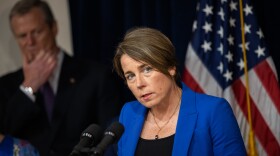Massachusetts lawmakers could be returning some money to taxpayers, although there are a lot of details still to work out.
The state has money to pay for something, maybe a tax rebate, expansion of the earned income tax credit, or changes to the estate tax.
Matt Murphy of the State House News Service lays out the latest from lawmakers.
Matt Murphy, State House News Service: We've seen the contours of a tax relief package really come into focus over the past several days. Last week, leaders of both the House and Senate announcing that they would pursue $500 million in tax rebates for many Massachusetts residents who are income-eligible. This would send checks by the end of September of $250 to individuals, $500 for married couples, to blunt the impacts of inflation and the cost of fuel, groceries and everything else.
And then [Monday] morning, we got word from leadership in both the House and Senate, that they had also agreed to the framework of an additional $500 million in tax relief. And while the details still need to be worked out, we understand that they have agreed to pursue increases in the earned income tax credit, tax credits for child and dependent care, tax credits for senior homeowners, as well as reforming the state's estate tax.
[The estate tax change is] something that Governor Charlie Baker has proposed. Currently, on inherited estates, you pay taxes on the value over $1 million. Many advocates pushing to increase this threshold to $2 million.
We are expecting to hear more and learn more of the details of these tax plans, at least what the House plans to pursue, later [Monday] morning when they detail a package that will go to the floor. But this this proposal really follows largely the contours of what the governor, Charlie Baker, proposed at the beginning of the year, minus some big pieces, such as reductions in the short term capital gains tax. But the push on tax relief really gaining steam this week, and we could see votes happening pretty soon.
Carrie Healy, NEPM: We should note that those tax rebates are not a done deal yet. They are on a time crunch. They're trying to finish this before the end of the month?
That's right. And this is just the framework of a deal. The details need to be worked out and it will start in the House. But all of this needs to be wrapped up by the end of July when formal sessions will end.
Governor Charlie Baker signaled last week that he would sign the tax rebate plan that lawmakers have pushed, but he may have other ideas, depending on the details of this broader $500 million reform package to some of the state’s tax code laws. So it remains to be seen how this will play out over the remaining couple of weeks of the formal session.
And this is coming because the fiscal situation in the state is pretty good right now. The Massachusetts Taxpayers Foundation says even with officials still crunching the June numbers, it's looking like the Legislature will see that surplus of about $3.6 billion when regulators close out the fiscal year. Are there still factors at play with these figures that could dramatically change that bottom line?
Certainly the Department of Revenue still calculating final tax collections for the month of June and the full fiscal year. But we know that the state has been well ahead of benchmarks.
They will have to use some of this surplus to pay some accounts that have gone over budget. Some of the surplus will be earmarked in automatic transfers to places like the MBTA. Some will go straight into savings.
The Taxpayer’s Foundation is estimating that as much as $3.6 billion could be available in, sort of, free cash spending. But a lot of that will depend on where the tax overages come. If it comes from capital gains taxes, for instance, a lot of that could be earmarked straight for the state's rainy-day fund, which is already at historic highs, savings that could mitigate future cuts if the economy goes into recession.
But even Democratic leaders in the Legislature last week signaling that they expect a surplus north of $3 billion for the year. So there is plenty of cash to go around and pay for things like this tax relief package of $1 billion that they plan to pursue this month.



